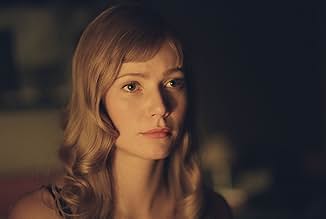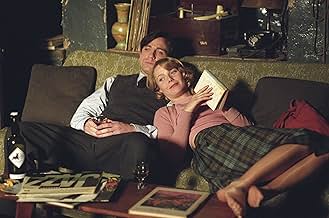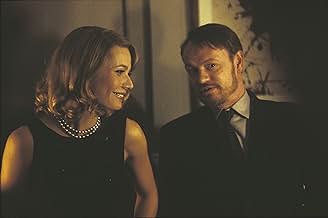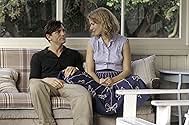ÉVALUATION IMDb
6,3/10
11 k
MA NOTE
Ajouter une intrigue dans votre langueStory of the relationship between poets Edward James "Ted" Hughes and Sylvia Plath.Story of the relationship between poets Edward James "Ted" Hughes and Sylvia Plath.Story of the relationship between poets Edward James "Ted" Hughes and Sylvia Plath.
- Prix
- 1 victoire au total
Avis en vedette
After viewing the film on Sylvia Plath, I felt a need to read about this poet and find out exactly what Hollywood did with it. As usual, Hollywood transformed a person's life into what an audience would want to be amused by. Mr. Hughes is personified as a womanizer and adulterer, the later of which may be true. After reading two biographies of Ms. Plath by Linda W. Wagner-Martin and Anne Stevenson and of course having studied Ms. Plath's poetry, I feel that the film, albeit entertaining does not depict her actual identity. It does a marginal account of her life, or part of her life. As any human being, Ms. Plath suffered from many demons. If you ascribe to an astrological standpoint (as Mr. and Mrs. Hughes did) you will find that Sylvia was doomed by her astrological sign, Scorpio. Those of you who are Scorpios know that there is a dark side to this sign. She set her expectations too high of most things and considered the failure of loyalty from her friends and family detrimental. Her experiences with depression only added fuel to the flame. Had she lived in modern times, maybe the newer therapies could have helped her. Depression is a severe affliction and may make a great poet, but for everyday living it can render a person helpless. It can make one helpless with dealing with marriage and children, life in general, and one's occupation. Sylvia Plath was a victim of her depression, her personality overreacting to life and her relationships. Unfortunately, she could not work her way through her inner problems and suffered the result of her mental blockage. Fortunately, for her children, they were unharmed by her mental illness and subsequent actions, and were eventually raised by their father. No one is to blame... no one is superhuman. If standards are set too high for anyone, as Sylvia set for herself, anyone is doomed to failure. We do have her poetry and novel(s) to see her inner self, which no film can properly depict.
It's 1956 Cambridge, England. American student Sylvia Plath (Gwyneth Paltrow) is dismissed by the high-minded poetry review. She is taken with fellow student Edward Ted Hughes (Daniel Craig)'s poems. They eventually get married. He has many female fans and she suspects his infidelity. They have two children. She struggles to write under successful Ted's overwhelming shadow. She falls into depression and eventually commits suicide in 1963.
It's a downbeat biopic that bothers on old-fashion melodrama. Paltrow is lovely but I figured Plath would be more fragile even before her breakdown. Daniel Craig has the prerequisite charisma. The movie is very flat. It is unable to elevate the material into something more dramatic. This is a long drawn out character study that isn't terribly interesting.
It's a downbeat biopic that bothers on old-fashion melodrama. Paltrow is lovely but I figured Plath would be more fragile even before her breakdown. Daniel Craig has the prerequisite charisma. The movie is very flat. It is unable to elevate the material into something more dramatic. This is a long drawn out character study that isn't terribly interesting.
Film biographies of cultural figures - art, music, literature - differ from those focused on great events and the men and women who either led others or contributed to the hallmarks of history. For a start, figures in the arts have nowhere near the broad drawing power of, say, a General Patton whose controversial larger than life war record is placed in a setting where there are many other important figures, all engaged in very documented and perennially debated actions.
In 1998, "Hilary and Jackie" explored alleged episodes in the short life of cellist Jacqueline Du Pre and her pianist, now also conductor, husband, Daniel Barenboim. Despite very very good acting the film was largely a descent into the basement of scurrilous storytelling by relatives of the dead musician. Whatever the truth of the claim that she bedded her sister's husband, the movie said nothing about the couple's meteorically brilliant early careers. It was slanted voyeurism writ large.
Director Christine Wells has taken a very different and insightful tack in exploring the life of poet Sylvia Plath and her marriage to Ted Hughes, a poet with laurels garnered while Ms. Plath was still starting up a not very steady ladder to recognition.
Plath, an American, met Hughes in England. A short courtship was followed by marriage and then two children. The relationship was tumultuous and eventually it foundered because of Sylvia's underlying emotional instability followed by her husband's desertion to another woman.
Sylvia had tried suicide at least once before meeting Hughes and she succeeded in 1963, not that many years after they met. Whatever fame she achieved in her life has been eclipsed by what can only be described as a cottage industry of people studying her relationship with Hughes, an activity more important to some than her very fine poems and her most famous book, a novel, "The Bell Jar." In short, the real Sylvia Plath, whoever she was, has been hijacked.
Wells takes a sympathetic view of Ted and Sylvia, not joining in the political debate over feminism and Sylvia's supposed maltreatment by Ted. Sylvia in this film is brilliant but also terribly brittle and her inner demons are not caused by a brutish or callous husband. As Platrow portrays her, I believe accurately, Sylvia was seriously and chronically depressed with life events worsening but in no regard initiating a downward spiral. Today she would probably thrive and be both prolific as a poet and happy as a person if successfully maintained on an effective anti-depressant.
Ted, played by Daniel Craig, is a bit transparent - loving but somewhat distanced by his own quest for fame. He hectors Sylvia to write more, annoyed that she bakes instead of composing verse while on a seaside vacation. He's supportive but also blind to the deepening reality that he is dealing with a woman who needs help, not critical comments about non-productivity.
The supporting cast is fine but this is Paltrow and Craig's film. She has a strong affinity for England and its culture (I believe she has moved there) and she gives the role deep conviction and understanding. It happens that she somewhat resembles Sylvia but the true recognition is internal and intellectual. And emotional, let's not omit that.
Hughes essentially inherited his wife's estate and there's no question that he, like Daniel Barenboim after Jacqueline Du Pre's death, received a mixed blessing. He superintended the posthumous publication of "Ariel," one of Sylvia's most enduring legacies. A man who only wanted to be a first-rate poet, he became (and still is post mortem) the subject of arguments as to his treatment of Sylvia and his responsibility for her taking her life.
"Sylvia" sets the record straight as Paltrow acts the part of a woman - mother as well as poet - who slowly loses control of her life while her husband reacts first with confusion and later with the self-protective armor of withdrawal.
Hughes went on to publish many fine poems and he became poet laureate of England, a post he definitely wanted and enjoyed (Hughes was one of the very few modern and relatively young intellectuals who was a convinced monarchist).
Not long before succumbing to cancer, Hughes published "Birthday Letters," an attempt to show through years of verse the nature of his relationship with Sylvia. Whether viewed as an apologia or a last record - and chance - to give his side, it's an impressive work. And "Ariel's Gift" by Erica Wagner is must reading for those who want more than a film and sometimes potted articles can provide. It analyzes the poets' relationship through the prism of Hughes's writings, most unpublished before "Birthday Letters." A recent book, "Her Husband: Hughes and Plath, Portrait of a Marriage," by Diane Middlebrook, is also recommended.
Incidentally, the film accurately shows Sylvia's suicide preparations which included putting breakfast next to her little kids' beds before opening their window wide and sealing their door so the gas she employed to dispatch herself wouldn't harm them. I've read articles where her adulators remark on this as evidence of her loving and solicitous nature. Rubbish. The gas supplied at that time would have blown the whole building sky high if anyone, through ringing a doorbell or smoking a cigarette, had introduced a spark into her flat. Anyone surviving such a suicide attempt under those facts would surely be prosecuted today.
The film score is very intrusive, signaling when important things are happening. The dialogue and Paltrow and Craig's faces do that very well.
9/10.
In 1998, "Hilary and Jackie" explored alleged episodes in the short life of cellist Jacqueline Du Pre and her pianist, now also conductor, husband, Daniel Barenboim. Despite very very good acting the film was largely a descent into the basement of scurrilous storytelling by relatives of the dead musician. Whatever the truth of the claim that she bedded her sister's husband, the movie said nothing about the couple's meteorically brilliant early careers. It was slanted voyeurism writ large.
Director Christine Wells has taken a very different and insightful tack in exploring the life of poet Sylvia Plath and her marriage to Ted Hughes, a poet with laurels garnered while Ms. Plath was still starting up a not very steady ladder to recognition.
Plath, an American, met Hughes in England. A short courtship was followed by marriage and then two children. The relationship was tumultuous and eventually it foundered because of Sylvia's underlying emotional instability followed by her husband's desertion to another woman.
Sylvia had tried suicide at least once before meeting Hughes and she succeeded in 1963, not that many years after they met. Whatever fame she achieved in her life has been eclipsed by what can only be described as a cottage industry of people studying her relationship with Hughes, an activity more important to some than her very fine poems and her most famous book, a novel, "The Bell Jar." In short, the real Sylvia Plath, whoever she was, has been hijacked.
Wells takes a sympathetic view of Ted and Sylvia, not joining in the political debate over feminism and Sylvia's supposed maltreatment by Ted. Sylvia in this film is brilliant but also terribly brittle and her inner demons are not caused by a brutish or callous husband. As Platrow portrays her, I believe accurately, Sylvia was seriously and chronically depressed with life events worsening but in no regard initiating a downward spiral. Today she would probably thrive and be both prolific as a poet and happy as a person if successfully maintained on an effective anti-depressant.
Ted, played by Daniel Craig, is a bit transparent - loving but somewhat distanced by his own quest for fame. He hectors Sylvia to write more, annoyed that she bakes instead of composing verse while on a seaside vacation. He's supportive but also blind to the deepening reality that he is dealing with a woman who needs help, not critical comments about non-productivity.
The supporting cast is fine but this is Paltrow and Craig's film. She has a strong affinity for England and its culture (I believe she has moved there) and she gives the role deep conviction and understanding. It happens that she somewhat resembles Sylvia but the true recognition is internal and intellectual. And emotional, let's not omit that.
Hughes essentially inherited his wife's estate and there's no question that he, like Daniel Barenboim after Jacqueline Du Pre's death, received a mixed blessing. He superintended the posthumous publication of "Ariel," one of Sylvia's most enduring legacies. A man who only wanted to be a first-rate poet, he became (and still is post mortem) the subject of arguments as to his treatment of Sylvia and his responsibility for her taking her life.
"Sylvia" sets the record straight as Paltrow acts the part of a woman - mother as well as poet - who slowly loses control of her life while her husband reacts first with confusion and later with the self-protective armor of withdrawal.
Hughes went on to publish many fine poems and he became poet laureate of England, a post he definitely wanted and enjoyed (Hughes was one of the very few modern and relatively young intellectuals who was a convinced monarchist).
Not long before succumbing to cancer, Hughes published "Birthday Letters," an attempt to show through years of verse the nature of his relationship with Sylvia. Whether viewed as an apologia or a last record - and chance - to give his side, it's an impressive work. And "Ariel's Gift" by Erica Wagner is must reading for those who want more than a film and sometimes potted articles can provide. It analyzes the poets' relationship through the prism of Hughes's writings, most unpublished before "Birthday Letters." A recent book, "Her Husband: Hughes and Plath, Portrait of a Marriage," by Diane Middlebrook, is also recommended.
Incidentally, the film accurately shows Sylvia's suicide preparations which included putting breakfast next to her little kids' beds before opening their window wide and sealing their door so the gas she employed to dispatch herself wouldn't harm them. I've read articles where her adulators remark on this as evidence of her loving and solicitous nature. Rubbish. The gas supplied at that time would have blown the whole building sky high if anyone, through ringing a doorbell or smoking a cigarette, had introduced a spark into her flat. Anyone surviving such a suicide attempt under those facts would surely be prosecuted today.
The film score is very intrusive, signaling when important things are happening. The dialogue and Paltrow and Craig's faces do that very well.
9/10.
I am pretty familiar with Plath's story, and am also a keen fan of her work, which i think contributed to my hesitancy in seeing the film. I did not have high hopes for this film at all, and honestly, I have to say that I was pleasantly surprised.
My main criticisms:
I found it hard to get past the whole 'Oooh look it's Gwyneth Paltrow as Sylvia Plath'. Someone who isn't famous on a global scale would have been more credible.
The whole premise of the film hinges on the deep passionate relationship of Plath and Hughes, yet I never really felt convinced by it. The relationship came across as quite two dimensional, and even pretty one sided on the part of Paltrow/Plath. Instead of being portrayed as an emotionally fragile woman driven to the edge by Hughes' constant philandering and ultimate betrayal, Plath actually seemed to come across as being deeply insecure and neurotic, constantly suffering from extreme PMT, and overreacting every time she saw Hughes even talking to another woman, rather than having genuine reason to suspect his infidelity.
There were a couple of key dramatic moments (such as after they have made love for the first time, and when they are out in the boat together) that felt very hammy, so disrupted the momentum of the piece.
The score is just awful. Totally totally overwrought, over the top, too loud and too much of it. Plus, as Paltrow/Plath really starts to lose her mind there is an almost constant sound of howling wind in the backgroud. Again, OTT. Less definitely would have been more.
HOWEVER
Ok, I complained about Paltrow above, but she really did a great job. She really is a very talented actress, and it is a shame the whole celebrity thing gets in the way. She was particularly fine in the latter stages of the film, and the sad descent into loneliness and irreversible depression was very well judged.
Likewise, Daniel Craig was very enigmatic, although I wonder whether the one sidedness of the relationship as mentioned above may have come from him.
As a whole the film was very sympathetic, and showed how hard it must have been for Hughes to live with Plath. It doesn't justify his behaviour but rather tries to show an understanding. It also evokes a sense of a time when poets were considered important.
This film stayed with me for some days after watching it, and I would recommend it. It is somewhat uneven in pace and direction, but I think Christine Jeffs is a director with talent, although her inexperience showed. But above all, it renewed my interest in both Plath and Hughes.
7/10
My main criticisms:
I found it hard to get past the whole 'Oooh look it's Gwyneth Paltrow as Sylvia Plath'. Someone who isn't famous on a global scale would have been more credible.
The whole premise of the film hinges on the deep passionate relationship of Plath and Hughes, yet I never really felt convinced by it. The relationship came across as quite two dimensional, and even pretty one sided on the part of Paltrow/Plath. Instead of being portrayed as an emotionally fragile woman driven to the edge by Hughes' constant philandering and ultimate betrayal, Plath actually seemed to come across as being deeply insecure and neurotic, constantly suffering from extreme PMT, and overreacting every time she saw Hughes even talking to another woman, rather than having genuine reason to suspect his infidelity.
There were a couple of key dramatic moments (such as after they have made love for the first time, and when they are out in the boat together) that felt very hammy, so disrupted the momentum of the piece.
The score is just awful. Totally totally overwrought, over the top, too loud and too much of it. Plus, as Paltrow/Plath really starts to lose her mind there is an almost constant sound of howling wind in the backgroud. Again, OTT. Less definitely would have been more.
HOWEVER
Ok, I complained about Paltrow above, but she really did a great job. She really is a very talented actress, and it is a shame the whole celebrity thing gets in the way. She was particularly fine in the latter stages of the film, and the sad descent into loneliness and irreversible depression was very well judged.
Likewise, Daniel Craig was very enigmatic, although I wonder whether the one sidedness of the relationship as mentioned above may have come from him.
As a whole the film was very sympathetic, and showed how hard it must have been for Hughes to live with Plath. It doesn't justify his behaviour but rather tries to show an understanding. It also evokes a sense of a time when poets were considered important.
This film stayed with me for some days after watching it, and I would recommend it. It is somewhat uneven in pace and direction, but I think Christine Jeffs is a director with talent, although her inexperience showed. But above all, it renewed my interest in both Plath and Hughes.
7/10
There is a certain type of undergraduate who sees Sylvia Plath as the victim-heroine of a period that lionized talented men but had no place for women of similar gifts, and fortunately this film does not pander to them. Poets rarely receive lavish acclaim or wealth during their lifetimes, and hers was at least equal to her talent and irrespective of her gender. Any reasonably critical reader of her autobiographical novel The Bell Jar can see evidence of serious mental illness, which in Plath's case went largely untreated, and this film chooses to focus more on that aspect of her life than on anti-feminist conspiracy theories. However, the film comes up short of fully showing Plath as the highly complex and contradictory person her contemporaries knew: sexy, seductive yet so harsh and venal in her judgments of men (especially her husband and her father) as to seem man-hating; also manipulative and vain and yet so insecure that she went long periods without writing. She was likely bi-polar and could on occasion be described as downright monstrous, yet the film hollywoodizes Plath into a more conventional 'troubled' melodrama heroine, rather than delving deeper into the brutal reality of the day-to-day life of someone with significant mental illness. This is surprising given that director Christine Jeffs' earlier film on mental illness, Rain, was unstintingly honest. Plath's well known life history is covered in straightforward biopic narrative: her close-distant, love-hate yo-yo relationship with her mother; her famous first suicide attempt and the subsequent year spent in a sanatorium that was the basis for The Bell Jar; her rocky marriage to British poet Ted Hughes that ended because of his infidelity; her prolific period as a celebrated poet and her eventual death by suicide while still young.
I should point out that I thought the cinematography and production design were wonderful. The excellent period look is established by bleeding out bright color from every scene while giving it an amber tint like old photographs. The sets were almost hyper-realistic - cluttered, dim and claustrophobic with none of the romanticized shininess that Hollywood often lavishes on period dramas.
I should point out that I thought the cinematography and production design were wonderful. The excellent period look is established by bleeding out bright color from every scene while giving it an amber tint like old photographs. The sets were almost hyper-realistic - cluttered, dim and claustrophobic with none of the romanticized shininess that Hollywood often lavishes on period dramas.
Le saviez-vous
- AnecdotesFrieda Hughes, Sylvia Plath's daughter and literary executor, didn't allow the producers to access to her mother's poetry. She also publicly denounced the project in a published poem of her own.
- GaffesWhen Ted and Sylvia are in bed together and she is discussing her suicide attempt, you can clearly see Daniel Craig's tattoo through the make up on his shoulder and Gwyneth Paltrow's hair net to which her wig is attached.
- Citations
Sylvia: [to Ted, after making love] We're not even two people. Even before we met, we were just these two halves, walking around with big gaping holes in the shape like the other person. And when we found each other we were finally whole. And then it was as if we couldn't stand being happy so we ripped ourselves in half again.
Meilleurs choix
Connectez-vous pour évaluer et surveiller les recommandations personnalisées
- How long is Sylvia?Propulsé par Alexa
Détails
- Date de sortie
- Pays d’origine
- Langue
- Aussi connu sous le nom de
- Ted and Sylvia
- Lieux de tournage
- sociétés de production
- Consultez plus de crédits d'entreprise sur IMDbPro
Box-office
- Budget
- 7 000 000 £ (estimation)
- Brut – États-Unis et Canada
- 1 315 498 $ US
- Fin de semaine d'ouverture – États-Unis et Canada
- 58 940 $ US
- 19 oct. 2003
- Brut – à l'échelle mondiale
- 2 917 393 $ US
- Durée1 heure 54 minutes
- Couleur
- Mixage
- Rapport de forme
- 2.35 : 1
Contribuer à cette page
Suggérer une modification ou ajouter du contenu manquant

























